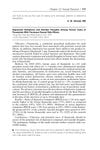 December 2018 in “Meandros medical and dental journal”
December 2018 in “Meandros medical and dental journal” A man developed a rare late-onset hair-pulling disorder, usually seen in younger people.
 August 2018 in “Journal of The American Academy of Dermatology”
August 2018 in “Journal of The American Academy of Dermatology” Finasteride, a hair loss drug, is linked to increased suicidal thoughts, particularly when used for hair loss.
 August 2018 in “Journal of The American Academy of Dermatology”
August 2018 in “Journal of The American Academy of Dermatology” Finasteride use for hair loss is linked to an increased risk of suicidal thoughts and a higher risk of suicide.
 August 2018 in “Journal of The American Academy of Dermatology”
August 2018 in “Journal of The American Academy of Dermatology” The conclusion is that finasteride is linked to an increased risk of suicidal thoughts and a higher risk of completed suicide when used for hair loss.
 January 2013 in “Yearbook of Urology”
January 2013 in “Yearbook of Urology” Former finasteride users showed higher rates of depression and suicidal thoughts compared to those who never used it.
 May 2012 in “The journal of nervous and mental disease”
May 2012 in “The journal of nervous and mental disease” The book provides comprehensive information on Impulse Control Disorders but lacks definitive evidence for effective treatments.
 August 2008 in “European Neuropsychopharmacology”
August 2008 in “European Neuropsychopharmacology” Some teenagers with anorexia nervosa have worse cognitive abilities, especially in visual and spatial tasks, and this is more common in those with a lower body weight.
 October 2004 in “European Neuropsychopharmacology”
October 2004 in “European Neuropsychopharmacology” Impulsiveness is common across various psychiatric disorders and linked to many psychological symptoms.
 August 1988 in “Journal of the Royal Society of Medicine”
August 1988 in “Journal of the Royal Society of Medicine” Hyperbaric oxygen therapy shows promise for multiple sclerosis, but skepticism and funding issues limit tech use in clinics, and outdated single-drug cancer treatments may cause unnecessary side effects.
 August 2018 in “Journal of The American Academy of Dermatology”
August 2018 in “Journal of The American Academy of Dermatology”  November 2003 in “Journal of Dermatology”
November 2003 in “Journal of Dermatology” Authors defend finasteride-depression link, suggest detailed medical history, and call for more investigation.
 989 citations,
August 2007 in “The Lancet”
989 citations,
August 2007 in “The Lancet” PCOS is a complex condition with major health impacts, needing more research for better diagnosis and treatment.
 359 citations,
September 2017 in “European Journal of Epidemiology”
359 citations,
September 2017 in “European Journal of Epidemiology” The Rotterdam Study updated findings on elderly health, focusing on heart disease, genetics, lifestyle effects, and disease understanding.
 336 citations,
August 2015 in “European Journal of Epidemiology”
336 citations,
August 2015 in “European Journal of Epidemiology” The Rotterdam Study found risk factors for elderly diseases, links between lifestyle and genetics with health conditions, and aimed to explore new areas like DNA methylation and sensory input effects on brain function.
 266 citations,
November 2013 in “European Journal of Epidemiology”
266 citations,
November 2013 in “European Journal of Epidemiology” The Rotterdam Study aims to understand disease causes in the elderly and has found new risk factors and genetic influences on various conditions.
 195 citations,
July 2005 in “American Journal of Human Genetics”
195 citations,
July 2005 in “American Journal of Human Genetics” Genetic variation in the androgen receptor gene mainly causes early-onset hair loss, with maternal inheritance playing a key role.
 171 citations,
October 1990 in “Alcoholism/Alcoholism, clinical and experimental research”
171 citations,
October 1990 in “Alcoholism/Alcoholism, clinical and experimental research” The document concludes that the exact way alcohol causes harm to fetal development is unknown, but it significantly affects nutrient transport to the fetus and a safe level of alcohol during pregnancy is not determined.
 142 citations,
January 2019 in “Frontiers in Neuroendocrinology”
142 citations,
January 2019 in “Frontiers in Neuroendocrinology” Postpartum depression is linked to changes in brain chemicals, inflammation, stress, and certain genes, and can potentially be identified by markers like specific steroids, serotonin levels, and vitamin D levels.
 123 citations,
December 2015 in “Journal of Neuroendocrinology”
123 citations,
December 2015 in “Journal of Neuroendocrinology” New targets for making and using brain-synthesized steroids could lead to better treatments for brain disorders and alcoholism.
 104 citations,
March 2014 in “The Journal of clinical endocrinology and metabolism/Journal of clinical endocrinology & metabolism”
104 citations,
March 2014 in “The Journal of clinical endocrinology and metabolism/Journal of clinical endocrinology & metabolism” DHT may increase the risk of heart disease and death in elderly men.
 82 citations,
August 2006 in “Pharmacology, Biochemistry and Behavior”
82 citations,
August 2006 in “Pharmacology, Biochemistry and Behavior” Certain steroids in the brain affect mood and symptoms of depression, and treatments targeting these steroids show promise for improving these symptoms.
 65 citations,
July 2013 in “International Clinical Psychopharmacology”
65 citations,
July 2013 in “International Clinical Psychopharmacology” Mood stabilizers like lithium and anticonvulsants have side effects that can lead to patients stopping their medication, and managing these effects is important for treatment adherence.
 64 citations,
February 1995 in “Journal of The American Academy of Dermatology”
64 citations,
February 1995 in “Journal of The American Academy of Dermatology” Lithium therapy may cause skin problems like hidradenitis suppurativa and other side effects, which can improve after stopping the medication.
 60 citations,
May 2018 in “Indian Journal of Psychological Medicine”
60 citations,
May 2018 in “Indian Journal of Psychological Medicine” Women with PCOS often experience anxiety, depression, and a lower quality of life.
 52 citations,
March 2016 in “JAMA dermatology”
52 citations,
March 2016 in “JAMA dermatology” Patients with PCOS rate their hirsutism higher than clinicians, and these self-ratings are more closely related to their quality of life and risk of depression.
 52 citations,
September 1996 in “Obstetrics & Gynecology”
52 citations,
September 1996 in “Obstetrics & Gynecology” People often struggle to consistently use contraceptives and other medications, and long-acting options might be better for those who want to avoid daily doses.
 47 citations,
January 2003 in “American Journal of Clinical Dermatology”
47 citations,
January 2003 in “American Journal of Clinical Dermatology” Mood stabilizers can cause serious skin reactions; careful monitoring and immediate treatment are crucial.
 43 citations,
November 2018 in “Nature Communications”
43 citations,
November 2018 in “Nature Communications” Genetic variations affecting skin structure play a key role in severe acne.
 38 citations,
April 2017 in “Journal of The American Academy of Dermatology”
38 citations,
April 2017 in “Journal of The American Academy of Dermatology” Many skin patients have mental health issues, but few dermatologists are well-versed in treating these conditions.
 36 citations,
March 2019 in “European Journal of Human Genetics”
36 citations,
March 2019 in “European Journal of Human Genetics” The research found genetic differences in identical twins that could explain why one twin has a disease while the other does not.






























